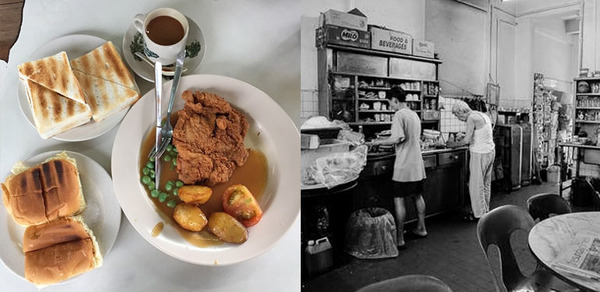Cover image via
@yeejiao (Instagram)
& Pinterest
This interesting piece of history was shared by Facebook user and avid coffee lover SY Chia, who told SAYS to pass on the knowledge.
When they finally arrived, other major dialect groups such as the Hokkien, Cantonese, and Teochew had already settled and dominated the more lucrative industries in Malaya such as trade, agriculture, and mining.
Many found work as chefs and staff at hotels, restaurants, and bakeries, while others became domestic servants for wealthy European and Peranakan families.
Some Hainanese people also took up jobs as cooks and canteen operators in British military bases and ship galleys.
At the time, property prices also dropped significantly.
Many Hainanese people who were working as chefs for the British quickly seized this opportunity, and with their savings, bought up places to set up small restaurants and kopitiams across the country.
And if you haven’t realised it by now, the term ‘kopitiam’ is made up of two words – ‘kopi’ meaning coffee in Bahasa Malaysia and ‘tiam’ meaning shop in Hokkien.
The typical kopitiam catered to the average to low-income workers, and all had similar basic white marble tables and green floral porcelain ware.
The menu persists until today, showing the fusion between the Hainanese people’s cooking skills and the style they had to adopt for their British employers: chicken chops with green peas and brown sauce, toast with butter and coconut jam, and roasted coffee sweetened with condensed milk.
They also sold tea, cakes, breads, and the quintessential soft-boiled eggs.
And until today, most kopitiams are still run by families of Hainanese descent, with businesses being handed down from father to son.
Among the traditional Hainanese kopitiams still operating to this day in Malaysia include:
– Restoran Yut Sun – Taiping, Perak (1921)
– White House Kopitiam – Kota Bharu, Kelantan (1935)
– Kluang Rail Coffee – Kluang, Johor (1938)
– Chong Kok Kopitam – Klang, Selangor (1940)
– Kedai Kopi Hai Peng – Chukai, Terengganu (1940)
– Restoran Hua Mui – Johor Bahru, Johor (1946)
Chia told SAYS that these original kopitiams have completely integrated with local communities and towns that they were started in, some even sporting halal certificates to now cater to Muslim patrons.
However, he sadly added that traditional kopitiams could be a dying heritage as new millennial cafes slowly take over our true national coffee culture.



